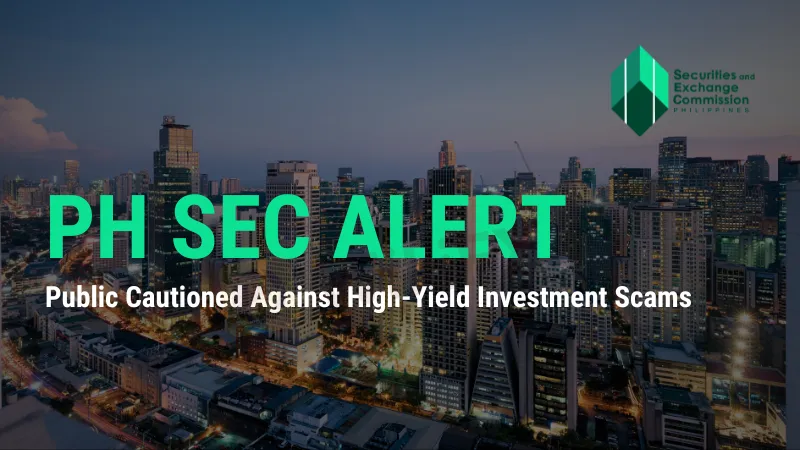简体中文
繁體中文
English
Pусский
日本語
ภาษาไทย
Tiếng Việt
Bahasa Indonesia
Español
हिन्दी
Filippiiniläinen
Français
Deutsch
Português
Türkçe
한국어
العربية
PH SEC ALERT: Public Cautioned Against High-Yield Investment Scams
Abstract:The Philippine SEC warns against "Tasking and Recharging" scams by ROBINSON COMPANY and AMERICA MALL-PH, citing illegal Ponzi-like operations and urging public caution.

The Philippine Securities and Exchange Commission (SEC) has issued a severe warning to the public against doing business with two firms, ROBINSON COMPANY and AMERICA MALL-PH, which have been tempting people with the promise of big profits via a “Tasking and Recharging” scam.
These companies are said to provide online assignments with substantial rewards upon completion. However, a deeper look by the SEC discovered that these businesses are not just dubious, but also unlawful, using a Ponzi-like structure in which profits to earlier participants are supported by the contributions of new investors.
ROBINSON COMPANY, which can be accessed via their internet platform, and AMERICA MALL-PH have both been revealed to be utilizing bogus certificates of incorporation, posing as real enterprises to entice naïve investors.
Robinson Company Certificate:

America Mall-PH:

The notion of “Tasking and Recharging” is classified as an “investment contract” under the Securities Regulation Code (SRC), which requires official SEC registration and license. Unfortunately, these schemes have the hallmarks of a Ponzi scheme, depending on a steady infusion of new investors to keep operations going, naturally disadvantageous to later participants and providing a considerable chance of loss.
In light of these findings, the SEC has stated that such schemes are fraudulent and unsustainable, rendering them unsuitable for registration or license for public securities sales.
The commission also emphasizes the legal ramifications of R.A. No. 11765, the “Financial Products and Services Consumer Protection Act 2022 (FCPA),” which criminalizes investment fraud, including Ponzi schemes and other similar operations that operate without formal SEC approval.
The general public is encouraged to proceed with great care and avoid investing or halting additional investments in these businesses. Anyone discovered advertising, sponsoring, or aiding these investment frauds may face legal action, including possible criminal charges, with fines ranging from five million pesos (Php5) to twenty-one years in jail.
The SEC protects investors and maintains financial market integrity. Individuals should verify investment options and report suspicious activity to the commission. Visit the Philippine Securities and Exchange Commission for more information or to report fraud.
Keep up with the most recent financial news and market movements. WikiFX Daily News may help you make educated trading choices by providing insightful analysis, updates, and expert perspectives. Explore immediately by clicking here!

Disclaimer:
The views in this article only represent the author's personal views, and do not constitute investment advice on this platform. This platform does not guarantee the accuracy, completeness and timeliness of the information in the article, and will not be liable for any loss caused by the use of or reliance on the information in the article.
Read more

Alleged Concerns with TradeEU.global's Trading Practices
An individual trader has come forward with allegations of an unfavourable experience while using the services of the broker TradeEU.global.

Lured by False Promises: Malaysian Driver Lost RM218K to an Investment Scam
A 49-year-old e-hailing driver in Malaysia fell victim to a fraudulent investment scheme, losing RM218,000 in a matter of weeks. The scheme, which falsely promised returns of 3 to 5 per cent within just three days, left the individual financially devastated.

SEC Fines Broker-Dealers $275K for Incomplete SAR Filings
SEC fines three broker-dealers $275K for filing deficient Suspicious Activity Reports, highlighting the importance of compliance with SAR filing regulations.

Mastercard's 2030 Vision: Biometric-Driven, Tokenized Payments
Mastercard’s tokenized future will eliminate card numbers and passwords by 2030, ensuring seamless, secure, and biometric-driven online shopping experiences.
WikiFX Broker
Latest News
Saxo & Portuguese Bank Partnership
SEC Fines Broker-Dealers $275K for Incomplete SAR Filings
Lured by False Promises: Malaysian Driver Lost RM218K to an Investment Scam
FTX Sets March 2025 Timeline for Creditor Payouts: What It Means for Investors
What is an Economic Calendar? How it works
Italian Regulator Warns Against 5 Websites
SFC Freezes $91M in Client Accounts Amid Fraud Probe
Bybit Launches Gold & FX Treasure Hunt with Real Gold Rewards
Mastercard's 2030 Vision: Biometric-Driven, Tokenized Payments
What Are the Latest Trends and Strategies in Philippine Gold Trading?
Currency Calculator


